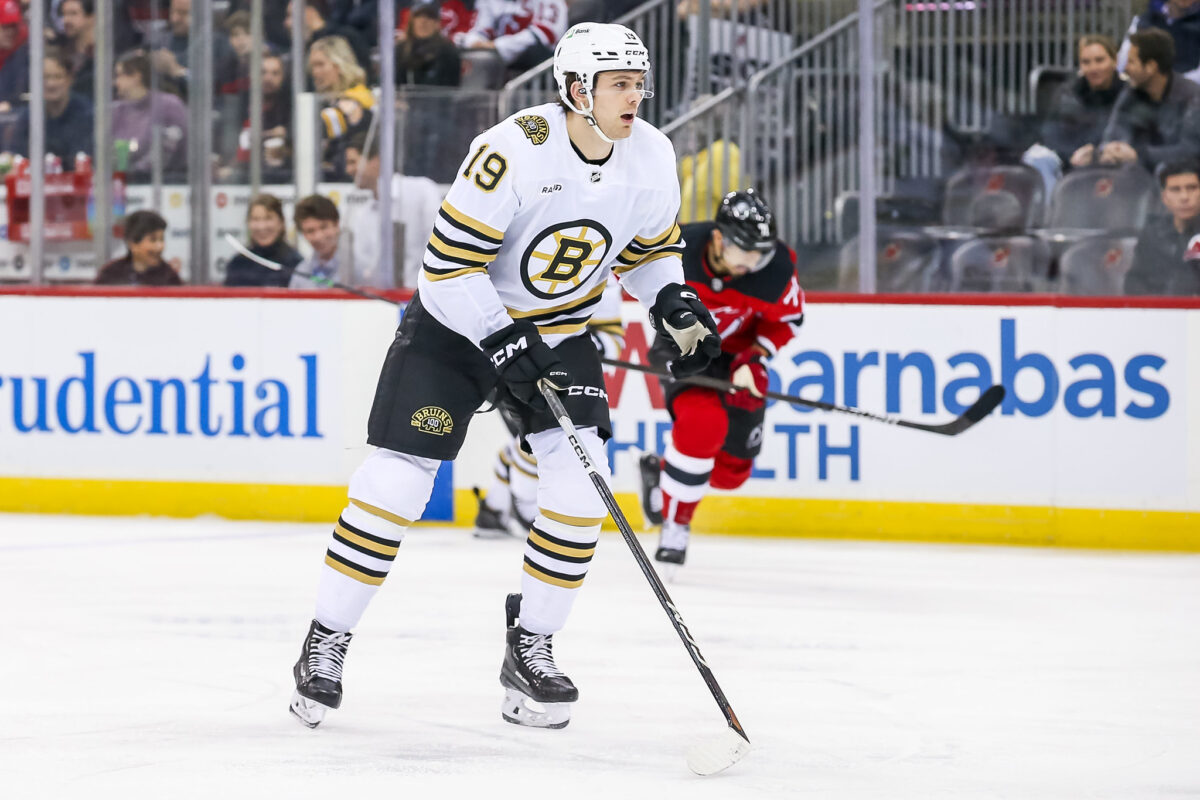When the Boston Bruins drafted Johnny Beecher in the first round of the 2019 NHL Entry Draft, they knew they were getting a big, intelligent forward who offered tremendous two-way value. Beecher’s game has never been flashy, but his intelligent, responsible play earned him praise from scouts, with Sportsnet’s Sam Cosentino calling him “one of the more cerebral players in this draft class.” Now, 52 games into his NHL career, Beecher is proving to be the dependable, two-way player the Bruins envisioned—a bottom-six cornerstone for years to come.

One of the first things to note about Beecher’s potential as a two-way threat is that his offensive output doesn’t project to be eye-catching. With seven goals and 10 points in 52 games during his rookie season, Beecher’s stat line doesn’t exactly leap off the page. Despite this, his 54.6% faceoff win rate and 1:40 of shorthanded ice time per game as a rookie do spark some excitement. These metrics indicate that Beecher is already an impact player in the NHL who still has room to grow and truly hone the key aspects of his game.
The Bruins are at their best when their bottom-six is rolling, and Beecher seems to have a strong understanding of his role with the team.
“I think any time your bottom six or your fourth line can go out there and give your guys momentum, it kind of puts teams on their heels a little bit. I mean, it’s huge for your top-six guys and your skill guys — it opens up the ice a little bit for them. (from ‘Consistency a focus for Johnny Beecher in second season with Bruins,’ Boston.com, Aug. 18, 2024)
At the same time, Beecher’s responsible play and well-rounded game have led some to believe that he might be too cautious, avoiding certain risks that could lead to increased offensive production. While this cautiousness is beneficial for a defensively-minded forward, Beecher’s understated skills could translate into more offensive output if he works on capitalizing on opportunities as they arise. This could set him up for success as a player in the long term and even open the door for him to slide into a third-line role if the situation ever calls for it.
This doesn’t come without obstacles, though.
Increased Offensive Output Can Increase Beecher’s Value to the Bruins
On the one hand, Beecher has never been an offensive dynamo at any level of his career, so expecting him to suddenly develop into one at the NHL level may seem unrealistic. On the other hand, playing alongside other NHL-caliber players could lighten his defensive burden and allow him to explore more offensive opportunities. As a prospect, Beecher was often a top player with significant responsibilities; as a second-year NHL player, he has the luxury of learning and making occasional mistakes as he adjusts to the pace and style of the league while having top-tier NHL talent helping to alleviate some of the pressure off of him.
Related: 5 Bruins Who Will Have Biggest Impact on 2024-25
This isn’t suggesting that Beecher completely throws caution to the wind and changes his game entirely. The ideal situation would be for Beecher to continue playing a nearly identical game, but capitalizing on small micro-situations and finding more success on the scoresheet. Still, Beecher’s role with the Bruins is clear—he’s not being asked to lead the team in scoring. Instead, the Bruins see him as a player who can stabilize their bottom six, contribute solid minutes on the penalty kill, and bring a consistent, reliable presence on the ice. This is where Beecher’s value truly lies. His ability to win faceoffs, kill penalties, and play a disciplined game makes him an ideal candidate for the Bruins’ bottom-six forward group.
Moreover, Beecher’s physicality and size are assets that the Bruins can leverage in matchups against tougher opponents. At 6-foot-3 and 216 pounds, he has the body to withstand the rigors of a full NHL season and the agility to keep up with faster players. His defensive instincts, combined with his size, allow him to effectively shut down opposing forwards, making him a valuable piece in the Bruins’ defensive schemes.
Beecher’s development will be crucial for the Bruins as they look to maintain their depth and competitiveness in the coming years. With the team still in a transition from the old guard to the new guard, the Bruins will need younger players like Beecher to step up and take on more significant roles. If Beecher can continue to develop his offensive game while maintaining his strong defensive play, he could become an even more valuable asset to the team.
